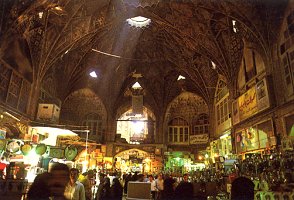 Iran has halted some of the most controversial elements of its nuclear programme in return for temporary relief from sanctions estimated to be worth $7bn (�4.2bn). BBC Persian's Amir Paivar looks at the potential impact on Iran's crippled economy.
Iran has halted some of the most controversial elements of its nuclear programme in return for temporary relief from sanctions estimated to be worth $7bn (�4.2bn). BBC Persian's Amir Paivar looks at the potential impact on Iran's crippled economy.In a television interview to mark his first 100 days in power, Iranian President Hassan Rouhani revealed that when he took office, his government was struggling to pay civil servants because the previous administration had emptied the treasury.
In that November 2013 broadcast, Mr Rouhani also said that supplies of basic foodstuffs were alarmingly low, with one province having reserves of wheat for only three days.
There is no better picture to portray the dire state of Iranian economy than this - a situation created by a mix of mismanagement and international sanctions.
Iran's central bank says the country's GDP shrunk by 5.8% last year.
It is against that backdrop that every dollar Iran frees up counts.
Revenue flow
Under the deal between Iran, the P5+1 - the US, UK, France, China and Russia, plus Germany - and the EU, there is a partial but reversible lifting of sanctions for six months.
Iran's oil exports will most likely remain at the current levels of just under a million barrels a day, less than half of what the country sold before the US began requesting that other major importers reduce their purchases "significantly" every six months, and an EU ban on the import, purchase and transport of Iranian oil came into force.
In fact, Iran's crude sales will also be aided by the suspension of the EU bans on European companies insuring Iranian oil shipments, and flagging and classifying Iranian tankers. Those measures made even "permitted" exports rather complicated.
On 20 January - the first day of the deal's implementation - major ship insurers in Europe, as well as those in Japan, announced they would resume coverage of tankers carrying Iranian oil, a $7.6bn facility that is essential in the oil business and was denied to Iran for 18 months.
A steady, if not increasing, flow of oil revenue in the next six months should help the Iranian government secure the imports of essential goods, food staples and medicines, and avoid the type of crisis Mr Rouhani said he was facing upon taking office.
No hard currency
But Iran will still not get all of its oil money in its accounts back home. Only $4.2bn (�2.5bn) of the almost $100bn (�60bn) stockpiled in banks across the world will be transferred over the next six months.
Strict financial and banking sanctions by the US and the EU, which block transfers in dollars or euros to Iranian government accounts, will remain in place.
When selling crude to China or India, Tehran will still receive Yuan and rupees, or will have to exchange oil for machinery and goods.
The only exception is the oil-for-gold business. The world powers suspended sanctions against Iran's purchase of precious metals, including gold, to which Tehran had turned to bypass the financial and banking sanctions.
Although Iran's automotive industry is now exempt from sanctions, Iranian manufacturers as well as their European or Asian partners will find it difficult to sell and buy spare parts or machinery because Tehran still cannot pay for them in hard currency.
While the prospect of a thaw in Iran's relations with the world has whet the appetite of investors and businesses from London to Tokyo, until financial sanctions are fully removed they are unlikely to make any major moves.
The partial suspension of sanctions gives Iran's drowning economy just a breath of air and keeps it afloat for the time being. But this wreck has a long way to go before it reaches the shores of rescue.
With the Geneva deal, President Rouhani can make sure the economy will not get worse, if not better. And for the average Iranian, the price of bread is not likely to go up - it may even go down.
By BBC
The Iran Project is not responsible for the content of quoted articles.










